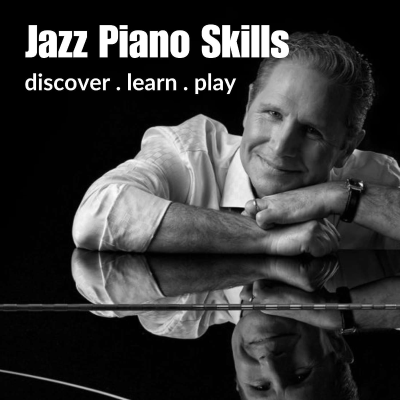
Jazz Piano Skills
inglés
Cultura y ocio
Empieza 7 días de prueba
$99 / mes después de la prueba.Cancela cuando quieras.
- 20 horas de audiolibros al mes
- Podcasts solo en Podimo
- Podcast gratuitos
Acerca de Jazz Piano Skills
A podcast introducing aspiring Jazz Pianists to essential Jazz Piano Skills. Professional Jazz Piano Lessons by Dr. Bob Lawrence, President The Dallas School of Music
Todos los episodios
316 episodiosChristmas Time is Here, Improvisation
Podcast Packets Illustrations [http://jazzpianoskills.store/podcast/2025/1216/illustrations.pdf] Lead Sheets [http://jazzpianoskills.store/podcast/2025/1216/leadsheets.pdf] Play Alongs [http://jazzpianoskills.store/podcast/2025/1216/playalongs.pdf] Forums Jazz Piano Skills Community [https://www.jazzpianoskills.store/forums/index.php] Keywords Jazz Piano, Improvisation, Christmas Time Is Here, Music Education, Jazz Skills, Melodic Analysis, Harmonic Analysis, Music Practice, Jazz Checklist, Music Learning Summary In this episode of Jazz Piano Skills, Dr. Bob Lawrence guides listeners through the intricacies of jazz improvisation, focusing on the classic tune 'Christmas Time Is Here.' The discussion covers harmonic and melodic analysis, the importance of a structured approach to improvisation, and the creation of a beginner's checklist to combat information overload. Listeners are encouraged to develop their improvisation vocabulary through melodic motifs and rhythmic variations, emphasizing the joy and process of learning jazz piano. Takeaways Week three focuses on improving jazz improvisation skills. The tune studied this month is 'Christmas Time Is Here.' Improvisation development is crucial for jazz musicians. A clear thought process simplifies music conceptually. The seven musical facts guide our approach to music. A beginner's checklist can help manage information overload. Melody is the starting point for improvisation. Rhythm and feel are foundational to playing music. Great solos are built from simple, developed ideas. Joy and curiosity are essential for progress in jazz. Titles Mastering Jazz Piano: Christmas Time Is Here Improvisation Essentials for Jazz Musicians Sound bites "We focus on improvisation development." "Improvisation begins with the melody." "Joy fuels progress in music." Support the show [https://www.paypal.com/donate/?hosted_button_id=ZZEBGDF38VFNS]
Christmas Time is Here, Melodic Analysis
Support the show [https://www.paypal.com/donate/?hosted_button_id=ZZEBGDF38VFNS]
Christmas Time is Here, Harmonic Analysis
Podcast Packets Illustrations [http://jazzpianoskills.store/podcast/2025/1202/illustrations.pdf] Lead Sheets [http://jazzpianoskills.store/podcast/2025/1202/leadsheets.pdf] Play Alongs [http://jazzpianoskills.store/podcast/2025/1202/playalongs.pdf] Forums Jazz Piano Skills Community [https://www.jazzpianoskills.store/forums/index.php] Keywords jazz piano, essential skills, Christmas time is here, Vince Guraldi, music theory, harmonic analysis, jazz improvisation, piano voicings, music education, jazz community Summary In this episode of Jazz Piano Skills, Dr. Bob Lawrence introduces the December tune, 'Christmas Time is Here' by Vince Guraldi. He emphasizes the importance of essential piano skills for playing jazz and outlines the seven facts of music that guide practice. The episode includes a harmonic analysis of the tune, exploring chord changes, voicings, and the learning process for jazz piano. Dr. Lawrence also addresses a listener's question about learning chords and highlights the benefits of community engagement through Jazz Piano Skills membership. Takeaways Essential piano skills are crucial for playing any genre. Music is fundamentally about sound and silence. Proper practice requires a clear understanding of music theory. The seven facts of music provide a framework for practice. Listening to various interpretations of a tune enhances learning. Cycling through chords quickly prevents stagnation in practice. Chords should be practiced by type and key for better retention. Paper practice is essential for mastering chords away from the instrument. Understanding harmonic function is key to improvisation. Voicings can significantly enhance the sound of a performance. Titles Unlocking Jazz Piano Skills Mastering Essential Skills for Jazz Sound bites "Practice efficiently and productively." "Listen to various artists to learn a tune." "Enjoy Christmas time is here and have fun!" Support the show [https://www.paypal.com/donate/?hosted_button_id=ZZEBGDF38VFNS]
How to Start Jazz Improvising
Podcast Packets Illustrations [http://jazzpianoskills.store/podcast/2025/1125/illustrations.pdf] Lead Sheets [http://jazzpianoskills.store/podcast/2025/1125/leadsheets.pdf] Play Alongs [http://jazzpianoskills.store/podcast/2025/1125/playalongs.pdf] Forums Jazz Piano Skills Community [https://www.jazzpianoskills.store/forums/index.php] Keywords music theory, scales, arpeggios, harmonic vision, melody, motif development Summary In this conversation, Dr. Bob Lawrence discusses the importance of mastering scales and arpeggios in music theory. He emphasizes the connection between harmony and melody, explaining how a strong understanding of harmonic structures can enhance a musician's ability to create and develop motifs. Takeaways You need to know your scales and arpeggios well. Harmonic vision is crucial for melody creation. Melody is derived from harmonic structures. Understanding arpeggios helps in motif development. Triad shapes can be extracted from sound. Familiarity with sounds enhances musical expression. Scales are foundational to music theory. Arpeggios provide motion in music. Developing motifs requires a grasp of harmony. Musical creativity stems from technical knowledge. Titles Unlocking Musical Mastery: Scales and Arpeggios The Art of Melody: Harmony's Role in Music Sound bites "How well do you know your scales?" "Melody flows from harmony." "Applying arpeggio and scale motion." Support the show [https://www.paypal.com/donate/?hosted_button_id=ZZEBGDF38VFNS]
A Beautiful Friendship, Improvisation
Podcast Packets Illustrations [http://jazzpianoskills.store/podcast/2025/1118/illustrations.pdf] Lead Sheets [http://jazzpianoskills.store/podcast/2025/1118/leadsheets.pdf] Play Alongs [http://jazzpianoskills.store/podcast/2025/1118/playalongs.pdf] Forums Jazz Piano Skills Community [https://www.jazzpianoskills.store/forums/index.php] Keywords music practice, scales, arpeggios, technique, musicianship Summary In this conversation, Dr. Bob Lawrence discusses the common practice of separating scales and arpeggios in music training. He emphasizes the importance of integrating these elements into a cohesive practice routine that focuses on music rather than merely treating them as technical exercises. This approach fosters a deeper understanding and appreciation of music among musicians. Takeaways We all tend to practice scales in arpeggios separately. They're discussed as separate technique exercises. We don't want to separate scales and arpeggios. Practicing them as exercises is a bad idea. We should practice them as music, not exercises. A double whammy to avoid is separating them. Integrating scales and arpeggios enhances musicianship. Mindset matters in music practice. Focus on music rather than technicality. Cohesive practice leads to better understanding. Titles Integrating Scales and Arpeggios in Music Practice The Importance of Musical Mindset Sound bites "We all tend to practice scales in arpeggios." "We don't want to do that." "Another really bad idea." Support the show [https://www.paypal.com/donate/?hosted_button_id=ZZEBGDF38VFNS]
Elige tu suscripción
Premium
20 horas de audiolibros
Podcasts solo en Podimo
Podcast gratuitos
Cancela cuando quieras
Empieza 7 días de prueba
Después $99 / month
Empieza 7 días de prueba. $99 / mes después de la prueba. Cancela cuando quieras.























